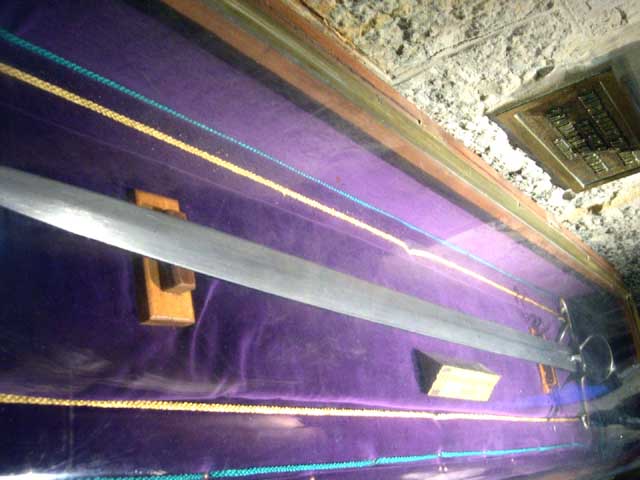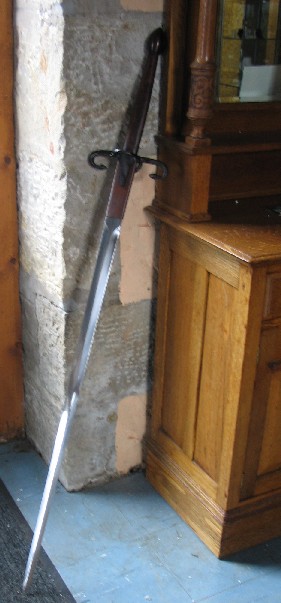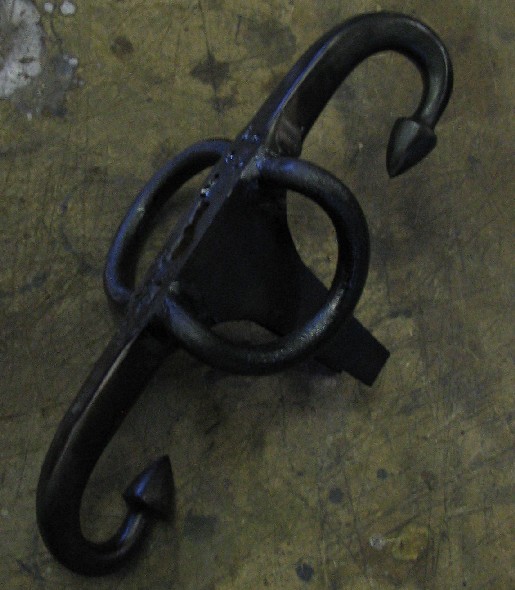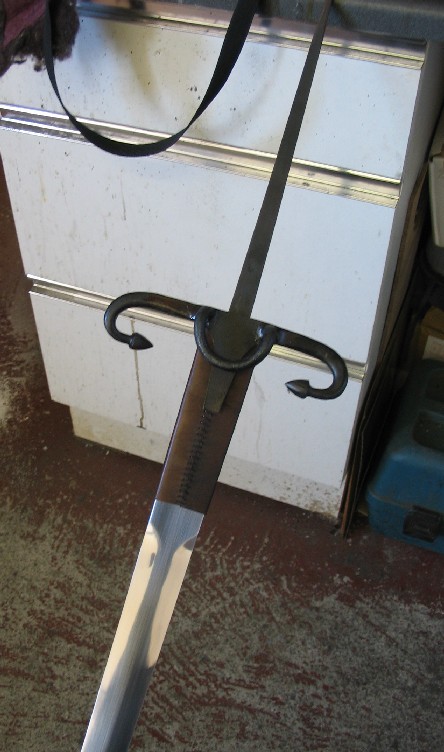I was just thinking about this: William Wallace was a Scottish fighter, aye? And Scotts used Claymores? Shouldn't William Wallace be using a claymore if he wanted a two hander? In the movie Brave Heart, the sword that he uses had a straight cross guard and a false grip, both of which, to my knowledge, were not features on a claymore. I heard some one tell me before that the sword of William Wallace is still preserved in some museum, does anyone know about it? Is it a claymore? Or does it look like what it looks like in the movie?
| Jack Yang wrote: |
| I was just thinking about this: William Wallace was a Scottish fighter, aye? And Scotts used Claymores? Shouldn't William Wallace be using a claymore if he wanted a two hander? In the movie Brave Heart, the sword that he uses had a straight cross guard and a false grip, both of which, to my knowledge, were not features on a claymore. I heard some one tell me before that the sword of William Wallace is still preserved in some museum, does anyone know about it? Is it a claymore? Or does it look like what it looks like in the movie? |
Neither.
The "Wallace Sword" as displayed in the Wallace Monument has a questionable provenance... there is another "Wallace" sword, also in Scotland, which provenance I do not know.
This was the topic of a fairly extensive thread not long ago...
Try this...
http://www.nationalwallacemonument.com/
[ Linked Image ]
I have moved this topic to the Off-topic Talk forum since a movie is being discussed.
Please note the description for this forum:
"Discussions of general history and other miscellaneous topics relating to arms and armour that do not specifically fit our other forums"
Thank you.
Please note the description for this forum:
"Discussions of general history and other miscellaneous topics relating to arms and armour that do not specifically fit our other forums"
Thank you.
More discussion can be found in this thread on the movie Braveheart
The traditional-style two handed Scottish "claymore" is a later weapon than the period of that movie. It would have been even less accurate than what they used. :)
First: Braveheart isn't even a historical movie. The history there is questionable at best--if I'm allowed to speak in euphemisms. Wallace didn't wear a kilt, Isabella was far too young to have had an affair with him, practically none of the battles actually happened the way they were depicted in the movie, and so on. The only things it got right, I guess, were that 1) Edward I was a ruthless commander and 2) Walalce could speak more than one language. That's all.
As for his sword...let's deal with the historical Wallace first. Sir William Wallace was a Lowland knight; he would have dressed the same way as an English knight and worn essentially the same equipment as any other European man-at-arms. Well, maybe his armor would have been somewhat lighter and less comprehensive. That's beyond the scope of the discussion, though, since we're talking about his sword--and in this sense I believe his sword would have been one of the types popular in Europe at the end of the 13th century. I'd say the Oakeshott types XII, XIII, and XIV and their sub-types would have been most likely for him although we can't discount the possibility of him using an older but still effective model like the Type XI.
I doubt that he would have used a "Claymore" at all. Just to get things clear, I really advise you to read the Features articles since there you'll find that "Claymore" can be taken to mean either a type of two-handed sword or an (almost entirely unrelated) type of one-handed basket-hilted broadswords. Generally, it is maintained that neither kind of sword existed as such before the 16th century, more than three centuries after Wallace's heyday. Some evidence can be interpreted to mean that the "claymore" by the former definition (i.e. a type of two-handed sword) might have existed earlier than the 16th century but I wouldn't consider it a strong reason to suppose that Wallace would have wielded such a "claymore." I still prefer to see him carrying a sword not substantially different from what an ordinary European man-at-arms would have worn.
Although, yes, that means he wouldn't have been carrying that Braveheart sword.
As for his sword...let's deal with the historical Wallace first. Sir William Wallace was a Lowland knight; he would have dressed the same way as an English knight and worn essentially the same equipment as any other European man-at-arms. Well, maybe his armor would have been somewhat lighter and less comprehensive. That's beyond the scope of the discussion, though, since we're talking about his sword--and in this sense I believe his sword would have been one of the types popular in Europe at the end of the 13th century. I'd say the Oakeshott types XII, XIII, and XIV and their sub-types would have been most likely for him although we can't discount the possibility of him using an older but still effective model like the Type XI.
I doubt that he would have used a "Claymore" at all. Just to get things clear, I really advise you to read the Features articles since there you'll find that "Claymore" can be taken to mean either a type of two-handed sword or an (almost entirely unrelated) type of one-handed basket-hilted broadswords. Generally, it is maintained that neither kind of sword existed as such before the 16th century, more than three centuries after Wallace's heyday. Some evidence can be interpreted to mean that the "claymore" by the former definition (i.e. a type of two-handed sword) might have existed earlier than the 16th century but I wouldn't consider it a strong reason to suppose that Wallace would have wielded such a "claymore." I still prefer to see him carrying a sword not substantially different from what an ordinary European man-at-arms would have worn.
Although, yes, that means he wouldn't have been carrying that Braveheart sword.
Last edited by Lafayette C Curtis on Sun 01 Apr, 2007 7:10 pm; edited 1 time in total
It has been questioned whether great swords and two handers were in general use during this region and time period at all. There are examples of supposed 14th cent. swords that we might consider to be long swords or great swords but I suspect they are rather later than the time period we are talking about.
I have yet to see or hear of any evidence of swords like that portrayed in the movie that would date to this time period at all, in Scotland or otherwise. Same goes for the "Wallace swords" that I have seen.
I have yet to see or hear of any evidence of swords like that portrayed in the movie that would date to this time period at all, in Scotland or otherwise. Same goes for the "Wallace swords" that I have seen.
| Lafayette C Curtis wrote: |
| First: Braveheart isn't even a historical movie. The history there is s**t.
|
Lafayette,
The tone and foul language are not necessary nor appropriate. Leave these things out of your posts.
I snapped some detailed pics of the Wallace sword that resides in Stirling, and posted them in the following thread ....
The 16th century sword of William Wallace ?
Mac
The 16th century sword of William Wallace ?
Mac
| Thomas McDonald wrote: |
| I snapped some detailed pics of the Wallace sword that resides in Stirling, and posted them in the following thread ....
The 16th century sword of William Wallace ? Mac |
Mac I never was able to post one on the last thread you had but here is a pic I took of the reproduction Wallace sword that resides in the same room. I have a McCallen reproduction and did not know how bad it was until I saw the actual sword.

The earlier thread on the subject of Braveheart, to which I contributed a bit, covered most of the bases as far as authenticity goes. But, I will add just a bit more.
William Wallace's prominence in Scottish politics was very brief. He came on the scene suddenly, gained the attention of the English authorities by killing some of their officials, and equally suddenly found himself at the head of a rebellion that had begun several years before. His time at the helm was punctuated by two major battles, one of which was total victory for Scottish arms and the other a total defeat. During his time as Guardian he worked very hard to gain the support of the continental powers for Scottish independence, with small success. After Falkirk he went into hiding and also traveled to Europe. While he continued to harrass the English he was never again able to mount a serious military threat. He was captured with the help of other Scots, taken to London, tried in a kangaroo court and immediately executed in a very barbarous manner. His memory may have helped unite the Scottish people against the English, but the real reason for the final success of Scottish arms lay with Robert the Bruce and others. Bruce was a schemer, a skilled politician and great leader. Wallace was apparently just a great leader.
It is doubtful that Wallace was 6'7" tall. It is highly unlikely that he ever saw the sword in the Wallace Monument. Most of the other stuff in the movie is just as unlikely and the film is an historical train wreck, to put it kindly. But, it was a stirring story, well-told even if you recognized and chose to disregard the factual errors, as I did, and probably led the Scottish people to vote for devolution a few years later.
In spite of what Wallace did, there is very limited documentation of his life and work remaining. One author who has done an admirable job of putting what is known together is James MacKay in his book William Wallace - Brave Heart. This book should not be confused with the little tome produced by Randall Wallace from the screenplay for the movie. This is the real McCoy.
Balliol, the Comyns and others, including Bruce, alternately courted favor with the English and fought against them in hopes of freeing their country, but also of becoming king of a free Scotland. Only Bruce was able to pull it off and, while the freedom and security of Scotland were important to him, so was the desire to secure a crown. Wallace apparently had no aspirations to become king, nor did he have the bloodline. We therefore must assume that he was a patriot, perhaps the only true patriot in the Scottish leadership of his time.
William Wallace's prominence in Scottish politics was very brief. He came on the scene suddenly, gained the attention of the English authorities by killing some of their officials, and equally suddenly found himself at the head of a rebellion that had begun several years before. His time at the helm was punctuated by two major battles, one of which was total victory for Scottish arms and the other a total defeat. During his time as Guardian he worked very hard to gain the support of the continental powers for Scottish independence, with small success. After Falkirk he went into hiding and also traveled to Europe. While he continued to harrass the English he was never again able to mount a serious military threat. He was captured with the help of other Scots, taken to London, tried in a kangaroo court and immediately executed in a very barbarous manner. His memory may have helped unite the Scottish people against the English, but the real reason for the final success of Scottish arms lay with Robert the Bruce and others. Bruce was a schemer, a skilled politician and great leader. Wallace was apparently just a great leader.
It is doubtful that Wallace was 6'7" tall. It is highly unlikely that he ever saw the sword in the Wallace Monument. Most of the other stuff in the movie is just as unlikely and the film is an historical train wreck, to put it kindly. But, it was a stirring story, well-told even if you recognized and chose to disregard the factual errors, as I did, and probably led the Scottish people to vote for devolution a few years later.
In spite of what Wallace did, there is very limited documentation of his life and work remaining. One author who has done an admirable job of putting what is known together is James MacKay in his book William Wallace - Brave Heart. This book should not be confused with the little tome produced by Randall Wallace from the screenplay for the movie. This is the real McCoy.
Balliol, the Comyns and others, including Bruce, alternately courted favor with the English and fought against them in hopes of freeing their country, but also of becoming king of a free Scotland. Only Bruce was able to pull it off and, while the freedom and security of Scotland were important to him, so was the desire to secure a crown. Wallace apparently had no aspirations to become king, nor did he have the bloodline. We therefore must assume that he was a patriot, perhaps the only true patriot in the Scottish leadership of his time.
| Chad Arnow wrote: | ||
Lafayette, The tone and foul language are not necessary nor appropriate. Leave these things out of your posts. |
Oh well. Edited to take account of that. It's just that I have such strong feelings towards the messed-up "history" of the movie that I couldn't resist the urge to employ some strong language.
Page 1 of 1
You cannot post new topics in this forumYou cannot reply to topics in this forum
You cannot edit your posts in this forum
You cannot delete your posts in this forum
You cannot vote in polls in this forum
You cannot attach files in this forum
You can download files in this forum
All contents © Copyright 2003-2006 myArmoury.com — All rights reserved
Discussion forums powered by phpBB © The phpBB Group
Switch to the Full-featured Version of the forum
Discussion forums powered by phpBB © The phpBB Group
Switch to the Full-featured Version of the forum


